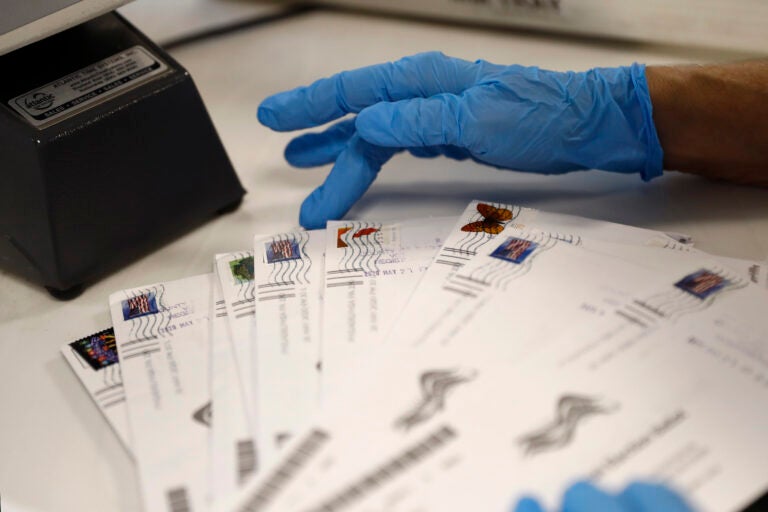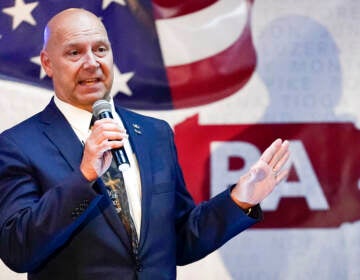Justices uphold Pennsylvania’s 2019 mail voting expansion
The 5-2 ruling means expanded vote-by-mail will almost certainly be in place for marquee races in November for governor and U.S. Senate.

A worker processes mail-in ballots at the Bucks County Board of Elections office prior to the primary election, Wednesday, May 27, 2020 in Doylestown, Pa. (AP Photo/Matt Slocum)
Pennsylvania’s Supreme Court has rejected a Republican-filed lawsuit that sought to overturn the commonwealth’s mail voting law.
Tuesday’s decision from the Democratic-controlled court means expanded no-excuse voting by mail, which state lawmakers passed into law in 2019, will almost certainly remain in place for November’s high-profile elections for governor and U.S. Senate.
But it’s also not the final word on the law.
Though the mail voting law, known as Act 77, was bipartisan and overwhelmingly successful, the issue has become highly political since the 2020 presidential election. Before, during, and after that election, Donald Trump pointed — baselessly — to mail voting as a reason he might lose, then did lose Pennsylvania.
Another GOP challenge to the law is still pending. As in the now-dismissed suit, the plaintiffs include several Republicans who initially voted in favor of expanding mail voting.
Millions of state voters have chosen to cast ballots by mail in recent elections, although Democrats have used it in far greater numbers since the law fell out of favor with Republicans following Trump’s attacks.
The ruling was 5-2, with the two Republican justices both voting no.
“We find no restriction in our Constitution on the General Assembly’s ability to create universal mail-in voting,” wrote Justice Christine Donohue in the majority opinion.
Widener Law Commonwealth professor Michael Dimino, who argued the case, declined immediate comment.
Voting rights groups applauded the decision. Khalif Ali, who heads the good government group Common Cause Pa., called it “a major victory for voting rights.”
The decision “ensures that millions of Pennsylvania voters can continue to cast their ballots safely and conveniently in the manner they choose,” Ali said. “There should be nothing partisan about ensuring that Pennsylvanians have the freedom to vote.”A lower court panel with a majority of Republican judges had thrown out the law in January, a ruling put on hold while the state Supreme Court reviewed an appeal by the administration of Democratic Gov. Tom Wolf.
In the new decision, the justices agreed with Wolf’s argument that the lower court wrongly based its decision on court rulings that addressed older versions of the state constitution that had invalidated laws passed in 1839 and 1923 to expand absentee voting.
The majority cited a provision of the Pennsylvania Constitution, “method of elections,” that says all elections shall be by ballot “or by such other method as may be prescribed by law.”
Wolf’s lawyers had told the court the current version of the state constitution should not be interpreted to outlaw voting by mail that goes beyond allowing it for people who are out of town on business, ill, physically disabled or performing election day duties or a religious observance.
They said the constitution establishes only minimums for absentee and mail-in ballots, minimums that for decades have been expanded by letting military spouses and those on vacation to vote by absentee ballot even though neither is expressly permitted in the state constitution.
Meanwhile, 14 Republican state lawmakers sued last month in another attempt to get the mail-in voting law thrown out. That lawsuit hinges on a provision that says the law becomes void when any of its requirements are struck down in court.
The pending lawsuit says the “non-severability” provision was triggered by a May 20 decision by a panel of the 3rd U.S. Circuit Court of Appeals over the law’s requirement that mail-in ballots have a voter’s handwritten date on the outside envelope. The federal appeals court panel found that a handwritten date had no bearing on a voter’s eligibility in a Lehigh County judicial race last November.
More than half of states now allow no-excuse absentee voting. Pennsylvania joined them in 2019, when Wolf agreed to a deal that also got rid of the straight-ticket voting by party option on ballots. But many Republicans soured on the law as Trump began making baseless claims mail-in voting was rife with fraud and urged Republicans to avoid it.
Republican lawmakers have sought to restrict mail-in voting by expanding the photo ID requirements and banning drop boxes.
The GOP’s nominee for governor, state Sen. Doug Mastriano of Franklin County, voted for the law but now wants to repeal it.
In one post-election lawsuit in 2020, Republicans sought to invalidate the mail-in voting law and throw out all ballots cast under it in a bid to overturn Democrat Joe Biden’s victory in Pennsylvania. The state Supreme Court threw it out, saying the plaintiffs “failed to act with due diligence” in waiting to challenge the law until after Trump lost the election. The U.S. Supreme Court refused appeals to intervene.
Lawyers who frequently contest lawsuits that seek to put new restrictions on voting or throw out certain ballots have said they think there’s an ulterior motive in all these lawsuits.
“The motivation here may be to keep fueling the big lie,” said Ben Geffen, a senior attorney with the Public Interest Law Center, after Republicans filed their second Act 77 lawsuit. “To keep encouraging voters to believe that there is something suspect about the way elections run in Pennsylvania when there’s not.”
WHYY reporter Katie Meyer contributed to this report.
WHYY is your source for fact-based, in-depth journalism and information. As a nonprofit organization, we rely on financial support from readers like you. Please give today.







